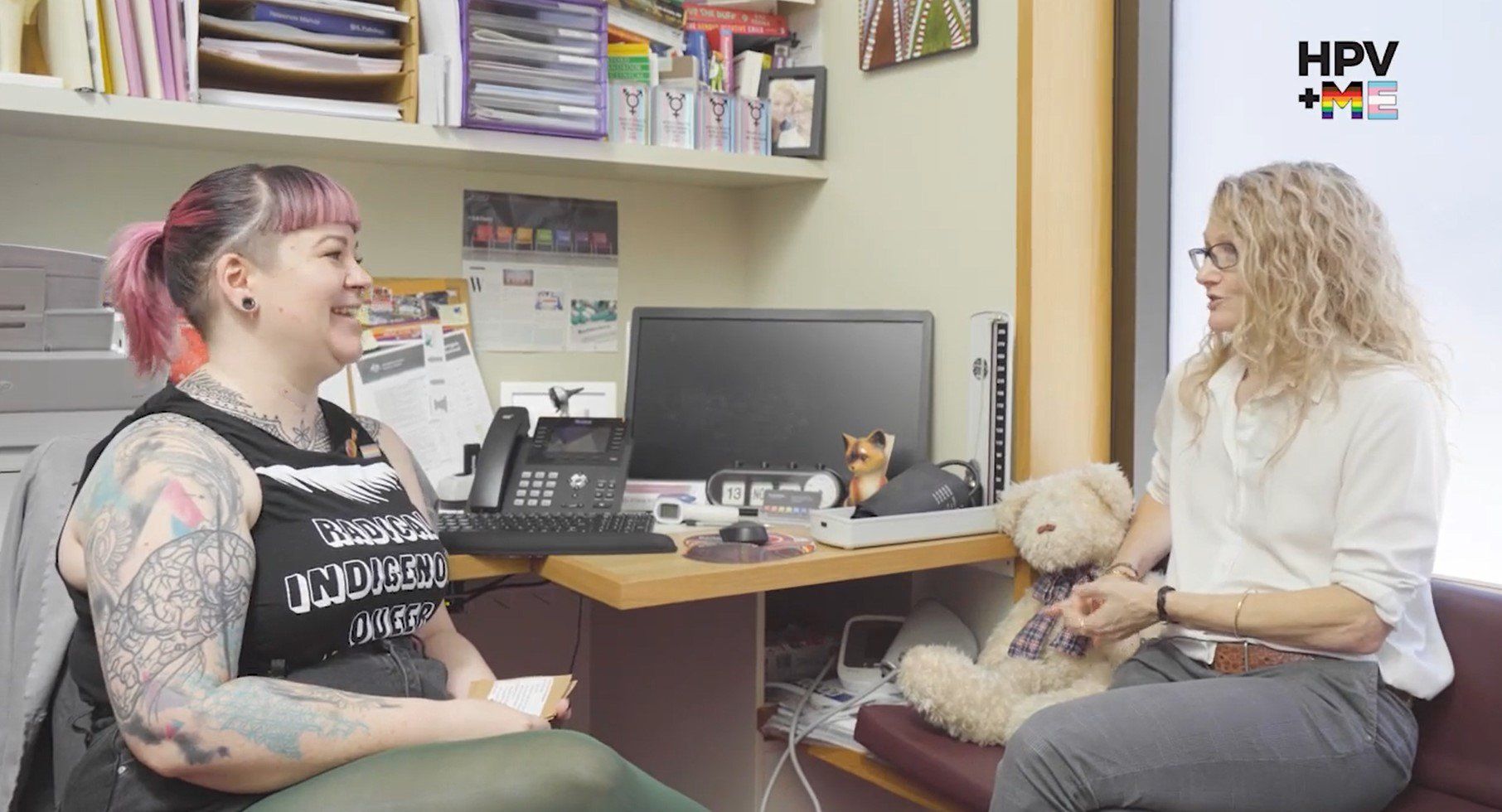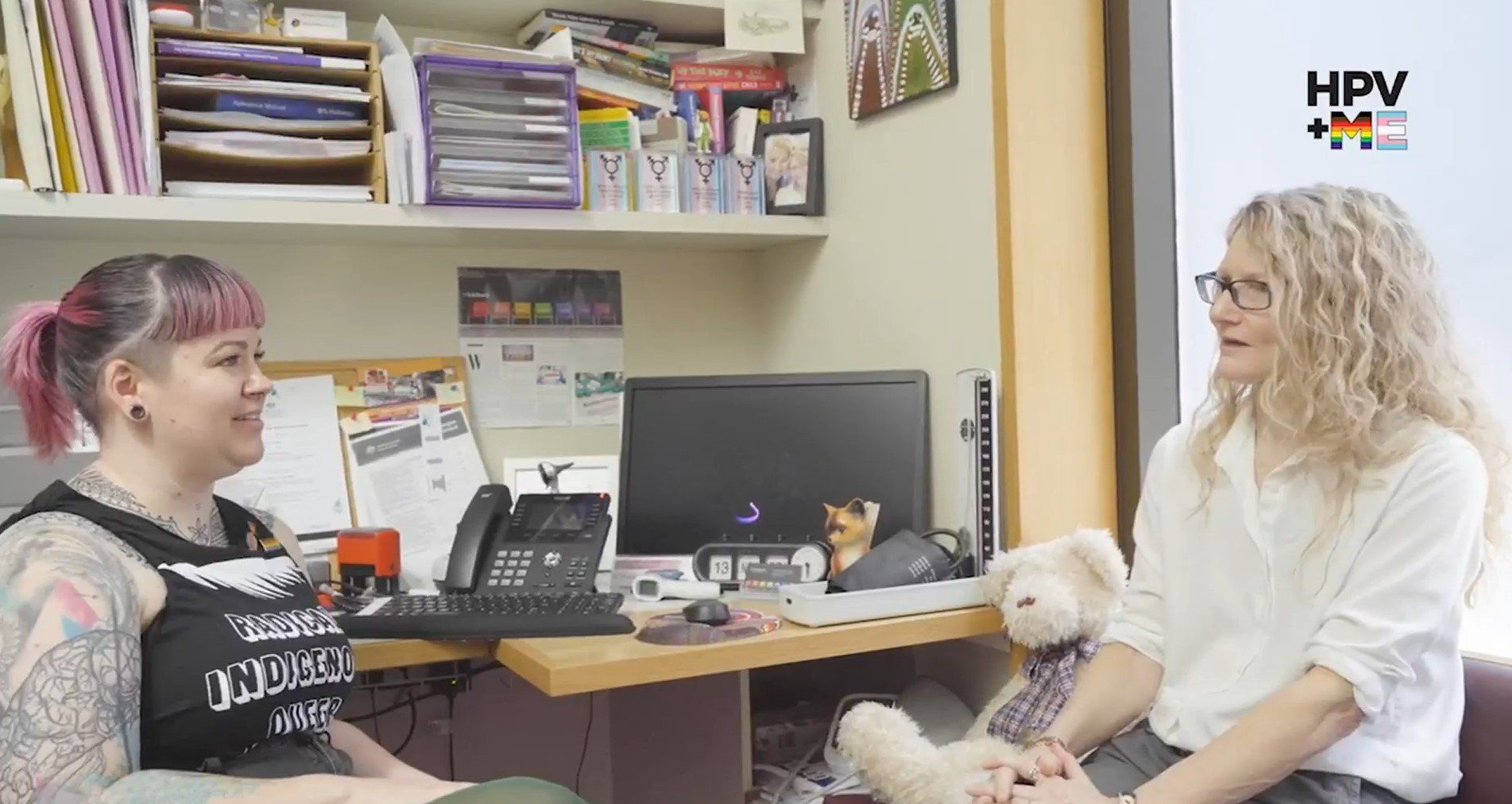Introduction to HPV
In this video for the community, Asha & Dr Bisshop discuss an introduction to HPV for LGBTIQ+ people.
The video will cover the following topics:
- What is HPV?
- How do you share HPV?
- How does HPV impact your body?
- Genital warts
- Cancer
- Myth busting re women who have sex with women & HPV
- Safer sex practices
- Testing for HPV
- Signs and symptoms of HPV
- Clearing HPV without treatment
- Where in your body does HPV impact?
- Screening for HPV
- Preventing HPV related cancers
- Smoking risk factor and HPV
- Genital warts treatments
- See your Dr for expert advice
Video Transcript
My name is Fiona Bishop. My pronouns are she/her and I am a GP. I work in the Valley and I've been working in the LGBTQI space for over 20 years.
I guess my first question is the big question, what is HPV?
HPV is a virus, the human papilloma virus. It's actually not just one virus, it's a whole host of viruses. But we know that there are certain viruses in the HPV family that cause significant medical problems. We know that HPV can cause changes in some cells in the body that go on to cause cancer, specifically cancer in the cervix, cancer of the anus and cancer of the throat and mouth, and also sometimes have vaginal cancers as well. The other thing is that it can cause genital warts. A number of the HPV viruses can make warts grow. Genital warts can be a terrible affliction for people. They're often very difficult to treat, they're really unpleasant, and they're very, very easy to catch because this virus is very easy to catch. It's not something that you particularly want to get. It's really important that we're talking about it and how to prevent it and how to know if you've got it.
How do we actually share HPV with each other? How do you catch HPV?
Well, yes, close intimate physical contact. To get HPV infection in the cervix, there needs to have been some sort of insertional activity going on. It doesn't necessarily have to have been somebody's penis, by the way, you can get HPV from sharing sex toys. You can also get it from fingers going in there and the same with anal activity as well. There used to be this myth which I hope has been dispelled now that for instance women who have sex with women don't need a pap smear because they're not having insertion or penile sex.
I've been told that by a GP before.
Unfortunately there's still doctors out there who tell people that and it's a completely untrue. It's a really old fashioned idea and it's not scientific. HPV is a virus. It doesn't discriminate. It doesn't care what body part it's on. It doesn't care what your sexuality or gender or sexual partner is. It's just a virus. It's looking for tissue to infect. You can catch HPV if it gets its way into where it likes to be.
So basically this comes back to safer sex practices 101 when we're engaging in any kind of sexual activity with any of our partners, it's around using a barrier when we can, washing our hands, washing our toys. That's the main ones?
Yeah. Yeah, I think so.
Use a condom on your toys between uses. So how would we know if we had HPV?
We now have tests that specifically look for HPV. It's not a blood test. It's not that easy. You actually have to get tissue or a sample or a swab from where the virus is to look for it and we can do a lab test called PCR test which detects the virus. And that's now the basis of what we do for the cervical screening test. What used to be called the Pap smear is now called the CST or cervical screening test. And in that test, they're looking for HPV. And the reason they're looking for it is because they know it's the precursor to almost 99% of cases of cancer in the cervix. You detect it by doing a special swab for it. The only swab you can get for looking for HPV is in the cervix or that part of the body. You can't do swabs in the throat or in other places that will test for it. That's really the only place you can get a test for it.
What are we then looking out for in terms of physical signs or symptoms? Is that like our next best indicator?
HPV is very sneaky and it doesn't tend to give you much indication that it's doing something in your body. So sure, if it's causing you to develop warts, you'll know about them. And that would probably prompt you to come to the doctor and say ‘Help, get rid of these!’, but in actual fact, when you get HPV infection somewhere like the cervix or in the back of your throat, you don't know that it's there and it doesn't give you any symptoms unless something goes wrong. We need to think about what happens when someone gets infected with HPV. And in fact, most people who get an HPV infection will clear it without any treatment. The majority of people who get HPV, within 12 months, it will have gone away because your immune system will have detected it and done its job and sent it packing. Maybe 70% of cases will disappear if we follow them over time. So if you get a diagnosis of HIV, there's no need to panic because the likelihood is the odds are on your side it's going to go away. If it doesn't go away, what happens next is that it can start to cause some changes in the cells that it's infected. It particularly likes certain types of cells. It really likes the cells in the cervix at the at one part of the cervix called the transformation zone. It also really likes cells in the anus as well, near where the anus and the skin mucosa kind of meet. It can cause changes in those cells. And what it does in those cells is it starts to make their DNA abnormal and over time it can make it more abnormal. We have a way of staging that. If you look at biopsies from abnormal cells, the pathologists call them Level 1, Level 2, Level 3. And then after Level 3 comes cancer. You can see there's this progression from an infection which may or may not go away and then you start getting an abnormality which also may go away. So even if you get a low grade abnormality, it doesn't mean you're going to get cancer because your body still has probably a 40 to 60% chance of clearing that, depending on your how healthy your immune system is. And then if it doesn't clear it, it progresses. The higher the grade of abnormality, the more likely that it's actually going to turn into cancer. Now this doesn't happen overnight, it doesn't happen in the space of weeks or months. It does take years which is why we have plenty of time with our screening to pick up cases, watch them over time and see whether they're developing into anything. So the whole point of screening for HPV is to pick up things early and be aware of them but don't be alarmed about them and just you know monitor. If it gets to the point where someone has an HPV related abnormality in their cells which is quite high grade, that's when we move on to actually wanting to burn those cells away or cut them away. That's when you go to see a gynaecologist and they do that. All of this process is about preventing a cancer from actually occurring. It's one of the only cancers that we can prevent like this. It's amazing that we can do it.
And I think it speaks to how preventative healthcare, developing good relationship with a GP, regular check-ins, why that's so important because there's a lot of leeway. A lot of prep time to get on top of things before it progresses for any further.
Exactly. The first step in that process is having that very first HPV test. And that is the sticking point, especially for people in the LGBTQI community because they may not have that relationship with the doctor where they feel comfortable talking about that part of their body, or even letting anyone see that part of their body. Having a GP who you feel comfortable with is a really important part of the process.
One of the things you mentioned was that there's multiple strands of HPV and I think some of the myths we've come across in our work around HPV is that once you have it, you have it for life. I guess my question is if we do get HPV, that's not necessarily something then that you would have for life?
HPV does get cleared by the body, which doesn't mean you can't catch it again, but you usually, yeah, most people will clear the virus from their body. There are some things that increase the risk of not being able to clear it and one of them is actually being a smoker. Smoking really increases the rate of progression of HPV-associated cellular abnormalities and we know that that's the case for whether it be cancer of the cervix or anal cancer or throat cancer. Definitely, smoking plays a big role in that.
Smoking in itself can be a risk factor for certain types of cancer, including throat cancer, but the combination of HPV infection and smoking puts you at higher risk as well.
We've maybe picked up a strain of HPV. We've developed genital warts. What are some of our treatment options?
For genital warts, usually they’re on the external genitalia and the treatments that we have are treatments that basically destroy the tissue that's grown and at the same time, destroy the virus, which is at the base of the wart. There's a couple of different ways you can treat them. There's a special cytotoxic paint that you can paint on. It takes a while to work, but it certainly does kill them off. What we tend to do here is we use a liquid nitrogen spray, which is like a super freeze. Don't try this at home kids, I wouldn't advise it because you can burn yourself quite badly. It's better to learn professional do these things, but that's another way of doing it. We don't usually surgically remove them unless they're really large and in which case we might do that initially. But usually, it's a combination of those things.
Does that just address the warts themselves? Would you still have HPV underlying?
Yeah, sometimes you they will come back, the virus might still be there. And if you freeze them off, there's about a 50% chance that that you may get a recurrence. Eventually they'll go away because your immune system is going to clear it anyway. There is another treatment, which is a special chemotherapy type cream that actually works by waking up your local immune cells to do that job for you. It's available on prescription and you can use that on external genital warts. It takes ages to actually be effective, but it has better cure rate around 80%, so that's another way of dealing with it if you're not in a hurry
Should you get them removed or would your immune system, if you were patient enough and just left it, they would disappear?
We always recommend removal because it speeds things up. And while they're there, obviously there's a risk of passing the virus on to sexual partners as well. Not all warts are warts, put it that way. It takes a trained eye to tell the difference. But what you think is a wart might not be. I guess that's an important point. People come in and think they've got a wart. It might turn out to be a haemorrhoid, might turn out to be a skin tag, it might turn out to be syphilis. It always pays to not do Doctor Google, but come and see someone and talk to them about what you think is wrong, and let the doctor have a look for you.





